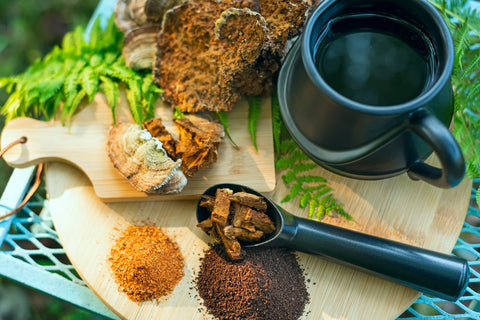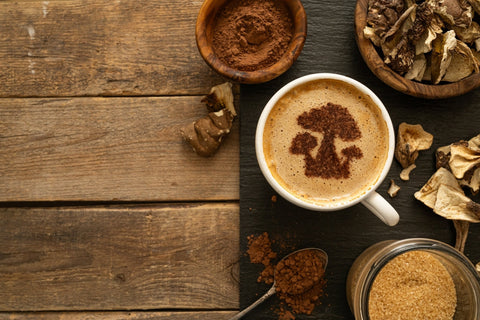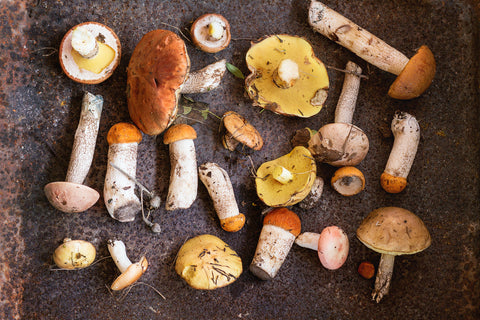Coffee is the world’s morning rocket fuel—yet, a new challenger is steadily climbing the ranks: mushroom coffee. From specialty shops to influencers’ kitchen counters, the question is everywhere: Mushroom Coffee vs. Regular Coffee—Which Brew Is Better For You?
In this in-depth look, we'll break down the science, benefits, drawbacks, and flavor experience of these two trendy brews. Curious to see if swapping your morning cup can ignite better focus, comfort, and health? Read on for the latest findings and expert insights!
What Exactly is Mushroom Coffee?
Mushroom coffee blends traditional coffee beans with powdered extracts of medicinal mushrooms—think reishi, chaga, cordyceps, and lion’s mane [1][2][3]. It keeps the classic morning ritual alive, but with a twist: instead of 100% coffee, a portion is replaced by these functional mushrooms [1].
Curious how mushroom coffee is made, what it tastes like, or how to get started as a beginner? Check out Mushroom Coffee FAQs for First-Timers.
This combo promises a similar bold aroma and flavor, but claims a smoother, steadier energy boost—and possibly extra wellness perks [1][2].
Side-By-Side: Mushroom Coffee vs. Regular Coffee
Let’s compare what each cup brings to your table [2][3][4]:
| Aspect | Mushroom Coffee | Regular Coffee |
|---|---|---|
| Caffeine Content | Lower—about 40-60mg per cup; smoother, gradual lift [2][3]. | Higher—~95mg per cup; quick surge, common crash [2]. |
| Health Benefits | Extra: cognitive, immune, anti-fatigue, adaptogens [1][3]. | Boosts alertness, mental focus [2][3]. |
| Antioxidants | Beta-glucans, melanin, ergothioneine + bean antioxidants [1][2][4]. | Chlorogenic acids, polyphenols—varies by roast [2][4]. |
| Nutritional Value | Added adaptogens and anti-inflammatories [1][2][3]. | Vitamins, minerals, caffeine [2]. |
| Taste Profile | Coffee-forward, hint of earthiness—no “mushroom soup” vibes [2]. | Robust, acidic, classic coffee punch [2]. |
| Digestive Comfort | Gentler on the stomach, less acidic [5]. | Can trigger acid reflux, more acidic [5]. |
| Side Effects | Fewer jitters, steady energy [1][2]. | Jitters, quick spike & crash [2][3]. |
| Cost & Availability | More expensive, may be harder to find[2]. | Affordable, everywhere[2]. |
Why Compare These Brews At All?
Coffee’s caffeine kick comes from blocking the “tiredness” brain chemical, adenosine, and ramping up cortisol (the stress hormone) [2]. This blast of energy is great for powering through a busy morning, but it’s equally notorious for causing jittery hands, heart palpitations, and a mid-day crash.
If you’re seeking a more in-depth breakdown of the health pros and cons of mushroom coffee versus your standard brew, don’t miss The Pros and Cons of Mushroom Coffee: Discovering This Trendy Brew.
Mushroom coffee keeps the familiar aroma and ritual but swaps part of the jolt-producing beans for mushroom extracts. The result? The taste is classic coffee, but the physiological ride feels different [2][3].
The Caffeine Curve: Spikes vs. Smooth Sailing
A standard cup of coffee has about 95mg of caffeine [2]. You feel turbocharged 30–45 minutes later, but that sharp peak often means a crash is coming. Mushroom coffee, by blending in adaptogenic mushrooms, usually lands between 40 and 60mg caffeine per serving. This smaller hit delivers more gradual and sustained energy, with less risk of a sudden drop [1][2][3].
Wondering if mushroom coffee’s adaptogen benefits really survive the brewing process? Learn more about what the science says in Maximizing the Nutritional Benefits of Mushroom Coffee.
People who have switched report calmer nerves, less anxiety, and a noticeably smoother mental lift [2][3]. That’s because adaptogens like reishi and cordyceps may help moderate the cortisol surge triggered by caffeine [1].
Enter the Adaptogens: What Medicinal Mushrooms Add
A regular cup of coffee only wakes you up—mushroom coffee might do more.
Lion’s Mane
- Compounds: Hericenones & erinacines
- Possible Effects: Boosts nerve growth and supports memory [1]
- Research: Some studies suggest improved cognitive function and recall (especially in older adults), but more research is needed on daily coffee blends [1].
Want to dig deeper into Lion’s Mane? Read The Health Benefits of Lion's Mane.
Cordyceps
- Compounds: Cordycepin
- Possible Effects: Enhances your body’s production of ATP (the molecule your cells use for energy)
- Research: Small human studies show better exercise performance and stamina; athletes may recover faster after intense activity [1][3].
Dive into more Cordyceps research and health insights at Cordyceps Benefits: Unveiling the Power of This Incredible Fungus.
Chaga
- Compounds: Polyphenols & betulinic acid
- Possible Effects: Powerful antioxidant; may protect against cell damage
- Research: Both test-tube and early human studies found improved antioxidant status and reduced markers of inflammation [1][3].
Go deeper into the health benefits of Chaga at The Health Benefits of Chaga.
Reishi
- Compounds: Triterpenes
- Possible Effects: Calms the nervous system, may support better sleep and lower anxiety[1].
- Research: Some evidence for fatigue and stress relief, often studied outside the coffee context[1].
Read more about "The Mushroom of Immortality" at Reishi: Exploring the 'Mushroom of Immortality'.
These adaptogens don’t neutralize coffee’s caffeine—they influence how you feel that energy, shaping a gentler, steadier ride [1][3].
To learn more about the spectrum of health benefits from functional mushrooms—spanning brain, immunity, energy, and skin—see The Health Benefits of Mushrooms: A Quick Overview.
Acidity, The Gut, and How Your Stomach Feels
Many people love coffee but hate the heartburn, bloating, or acid reflux that can follow. That’s no surprise: normal coffee is acidic (pH ~4.5–5) [5]. Mushroom powders buffer the brew, nudging the pH closer to neutral, making it easier on your digestive system [5].
How may your stomach and bowels react to mushroom coffee compared to regular coffee? For a closer look at digestive benefits and potential downsides, read Does Mushroom Coffee Make You Poop?
According to the experts at the Cleveland Clinic, individuals with gut sensitivities or reflux often find mushroom coffee more tolerable to drink, especially when used as a replacement for their high-acid morning cup [5].
Antioxidant Payload: More Than Just Caffeine
Both kinds of coffee provide a host of antioxidants; coffee alone is rich in polyphenols and chlorogenic acids [2][4]. Mushroom coffee, however, adds new layers: beta-glucans, ergothioneine, melanin complexes, and other radical-fighting compounds from mushrooms [1][4].
Some early studies hint that combining mushrooms and coffee increases the total antioxidant power of your cup through their “synergistic” effect (meaning, 1 + 1 could equal 3, not just 2) [1][4].
Brewing, Taste, and Experience
Mushroom coffee is easy to prepare—brew it just like traditional coffee using a drip setup, French press, or pour-over [2]. The main difference is the flavor: most blends are “coffee first,” with a mild, earthy finish. Unless you use a very heavy hand with the mushroom powder, you’ll never mistake it for mushroom soup [2].
Taste is subjective, of course. Some adventurous coffee lovers find the flavor interesting and smoother. Others, especially classic coffee purists, prefer the bolder, sharper punch of regular beans [2]. If you’re curious, check commercial blends that keep mushrooms below 20-25% for the most familiar taste.
Ready to explore more potential perks in your cup? Mushroom Coffee Benefits: A Brew of Health and Innovation takes a deeper dive into reduced jitters, immune support, and other innovative advantages.
Sustainability Snapshot
Coffee is beloved worldwide, but traditional coffee farming is resource-intensive and can be hard on the planet [2]. Some mushroom coffee makers use mushrooms grown on agricultural by-products and compostable packaging to cut their carbon footprint [2].
By blending mushrooms and using less coffee per serving, these companies aim to reduce their environmental impact and explore new revenue streams for farmers. While it’s still a relatively young industry, the sustainability aspect of mushroom coffee is beginning to gain attention worldwide [2].
Who Might Choose Which?
Stick with regular coffee if:
- You love the classic, strong coffee flavor and robust punch.
- You need a high dose of caffeine for athletic performance or all-nighters.
Try mushroom coffee if:
- You want an energy boost minus the jitters and mid-day crash.
- You’re sensitive to acidity or have stomach issues [5].
- You’re looking for bonus perks: immune support, cognitive clarity, or stress resilience [1][3].
- You’re eager to try an evolving, sustainable coffee movement.
If you’re still not sure if mushroom powder coffee, capsules, or another supplement format is ideal for your goals and taste, check Exploring Mushroom Supplements: Which is Best for You?.
The Limitations and Research Gaps
It’s important to remember: most research on mushroom coffee’s claimed benefits is still in early days. Many promising findings come from studies of mushrooms themselves (not always in coffee drinkers) [1][3]. There’s more robust evidence for immune and antioxidant effects than for dramatic weight loss, anti-inflammatory power, or metabolic shifts in humans [1].
Want a balanced, practical overview of the pros and cons before you buy? Our guide The Pros and Cons of Mushroom Coffee: Discovering This Trendy Brew spells it out with real-world tips.
Flavor is also a dividing line. If you’re adventurous, you might love mushroom coffee’s subtle earthiness; if you’re a “bold and black” loyalist, it might take some getting used to [2].
Finally, price and access are higher hurdles for mushroom coffee—it’s a premium product, both at coffee shops and for home brewing [2].
The Bottom Line: Which Brew Wins?
Both drinks deliver a comforting ritual, a caffeine spark, and a chance to connect—whether over breakfast or a Zoom meeting [4]. Regular coffee? It’s the time-tested favorite for fueling early mornings and social rituals. Mushroom coffee is designed for explorers: those seeking a gentler high, a steadier focus, or that little extra edge for immunity and wellbeing [1][2].
Whichever you choose, your cup can be both an energizer and a source of joy.
Ready to swap spikes for steady clarity? Try a bag of mushroom coffee, brew it your favorite way, and see how your day unfolds. You might discover a whole new side to your coffee routine!
References
- https://www.webmd.com/diet/
mushroom-coffee-health- benefits - https://balancecoffee.co.uk/
blogs/blog/mushroom-coffee-vs- regular-coffee - https://lairdsuperfood.com/
blogs/news/shroom-coffee - https://ommushrooms.com/blogs/
blog/mushroom-coffee-vs- regular-m2 - https://health.
clevelandclinic.org/mushroom- coffee-should-you-be-drinking- it


